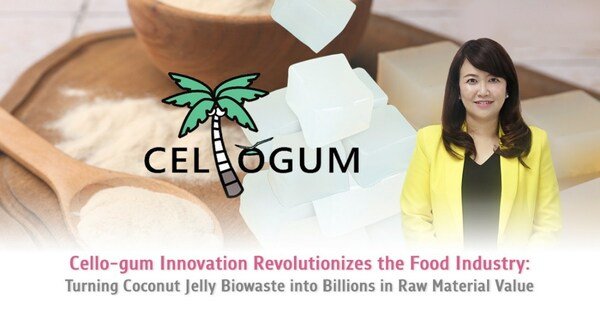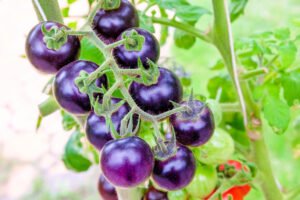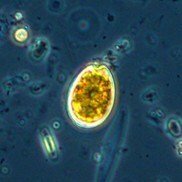Friday, 6 February 2026
Thai Scientists transform coconut jelly bio waste into food ingredients
These additives can be upcycled for use in the food, pharmaceutical, and cosmetic industries, reducing the need for costly imported additives in Thailand Cello-gum, a groundbreaking innovation by Prof. Dr.…

These additives can be upcycled for use in the food, pharmaceutical, and cosmetic industries, reducing the need for costly imported additives in Thailand
Cello-gum, a groundbreaking innovation by Prof. Dr. Hathaikarn Manuspiya from the Petroleum and Petrochemical College at Chulalongkorn University, transforms coconut jelly bio waste into valuable food ingredients worth billions of baht.
This collaboration between Chula researchers and companies like Ampol Food Processing Co. Ltd. effectively repurposes tons of leftover coconut jelly scraps into efficient food additives. These additives can be upcycled for use in the food, pharmaceutical, and cosmetic industries, reducing the need for costly imported additives in Thailand.
The research team is confident that this success will set a precedent for circular economy development, aiming to increase the value of waste generated by the food and agricultural industries. This approach aligns with creating a zero-waste society, where nothing is left for incineration.
Cello-gum is a nanocellulose product derived from coconut jelly, utilising raw materials abundant in Thailand. The residual jelly scraps, typically discarded as waste from the coconut jelly production process, are ingeniously transformed into products that serve as effective additives in food, medicines, and cosmetics.
Prof. Dr Hathaikarn Manuspiya, Director of the Centre of Excellence in Petrochemical and Materials Technology (PETROMAT), lecturer at Chulalongkorn University’s Petroleum and Petrochemical College, and founder of BioNext Company Limited, led the research team. This team, which includes Assoc. Prof. Dr Sarute Ummartyotin, Varoon Varanyanond, Phiyawat Sathidvongkun, and Dr Pongpat Sukhavattanakul, deserve credit for the innovative idea that paved the way for this breakthrough. Beyond addressing the issue of food waste through circular economy principles, Cello-gum also has the potential to enhance the value of waste generated in the food production process.
According to Prof. Dr Hathaikarn, Chula possesses the expertise to apply bacterial cellulose to a chemical process using biotechnology, leading to the production of additives applicable across the food, medicine, and cosmetics industries. These additives serve as useful substances for controlling the viscosity and providing texture to various products.
“Food stabilisers play a pivotal role in industries such as food, cosmetics, and medicine,” explained Prof. Dr Hathaikarn. In rice milk products, for example, additive substances are essential to maintain colloidal properties, preventing the milk from separating into layers. This enhances the texture, giving the product the appearance of containing rice. The same goes for fruit juices that often incorporate cellulose-based additives to augment content.”
Traditionally, research teams moulded bacterial cellulose into membranes, presenting themselves in the form of food preservation film or labels. However, upon establishing connections with diverse groups in the food industry, particularly with companies like Ampol Food Processing Co. Ltd., a global exporter of coconut jelly, ideas flourished. This collaboration aims to leverage the knowledge of bacterial cellulose to create additives that add significant value to coconut jelly scraps.
Technology
Australia Approves Commercial Release of GM Purple Tomato
Feb 06, 2026 | Australia
Detmold Group Reports Progress on Emissions Reduction, Circular Packaging Goals
Feb 05, 2026 | Australia
FAO on Balancing Climate Urgency and Food Safety in Emerging Agrifood Technologies
Feb 05, 2026 | Food Security
Food Testing
AFNOR International Eyes Global Food Safety Growth with HACCP Group Takeover
Feb 04, 2026 | Australia
Incheon National University researchers uncover hidden toxin risks during nutrient-starved algal blooms
Feb 02, 2026 | Food Safety and Testing
How audit-led approaches are reinforcing trust in retail food safety
Feb 02, 2026 | Food Safety and Testing
More Popular
Fertility Meets Farm-to-Table Dining with Launch of ‘The Fertility Table’ in India
Feb 06, 2026 | Company News
Australia Approves Commercial Release of GM Purple Tomato
Feb 06, 2026 | Australia
Alternative Proteins Could Add €111 Billion Annually to EU Economy by 2040, Study Finds
Feb 06, 2026 | Europe






